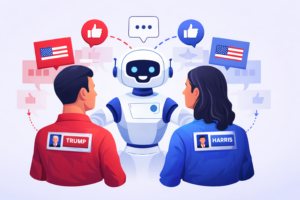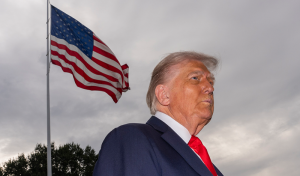
With the second Trump administration settling into its second year, 2026 promises to bring continued evolution in technology policy. Our scholars are examining the developments likely to shape the year…
By The Editors | January 9, 2026

Automatic-reply, out-of-office (OOO) emails are generally informative, innocuous and noncontroversial. They’re frequently formulaic—templates abound—and Microsoft offers instructions for their creation. However, the OOO emails at the heart of a First…
By Clay Calvert | January 8, 2026

Artificial intelligence is currently the shiny toy in tech, and when discussing it, most focus on the “AI stack,” data centers, or chips as the most vital aspect of furthering…
By Shane Tews | January 7, 2026

Keep an eye on a recent case filed by the Pacific Legal Foundation (PLF). It may broaden recognition of something the Supreme Court has found: Cell phones are no ordinary…
By Jim Harper | January 6, 2026

The US Court of Appeals for the Second Circuit in October delivered a significant triumph for the online speech rights of public high school students over educators’ authority to discipline…
By Clay Calvert | December 23, 2025

As large language models (LLMs) increasingly replace traditional search engines as tools for information gathering, the use of AI in the political arena—and its impact on elections—is inevitable. Recent research…
By John Bailey | Julia Torres | December 22, 2025

A federal appellate court recently delivered a remarkable win for the online, off-campus First Amendment speech rights of public high school students, even when posting social media content that most…
By Clay Calvert | December 22, 2025

As 2025 comes to a close, we’re taking the time to look back and analyze some of the most notable developments in tech policy. The following represents the technology and…
By The Editors | December 19, 2025

Recently, iRobot—the Massachusetts-based company that pioneered the robot vacuum—announced that it is filing for Chapter 11 bankruptcy. Soon, it will be acquired by its Chinese manufacturer and lender, Picea Robotics.…
By Mark Jamison | December 19, 2025

On October 1, the 2015 Cybersecurity Information Sharing Act (CISA 2015) silently lapsed at the beginning of the government shutdown. With it no longer active, we lose a crucial information-sharing…
By Shane Tews | December 18, 2025

Maybe it’s merely a manifestation of our uncivil, politically polarized times, but disputes involving whether hateful or otherwise offensive social media messages cross the line separating “uninhibited, robust, and wide-open”…
By Clay Calvert | December 17, 2025

On December 10, Australia’s long-awaited and much-heralded provisions governing social media use by individuals under 16 came into force. This regulation, which is widely described as banning under-16s from social…
By Bronwyn Howell | December 16, 2025

President Trump’s new Genesis Mission is an ambitious bid to energize American scientific leadership by harnessing artificial intelligence to accelerate discovery. It is a bold and correct step. But unless…
By Mark Jamison | December 11, 2025

What a delight to see the Privacy and Civil Liberties Oversight Board (PCLOB) taking a look at financial surveillance policy. It is as threatening to liberty and privacy as any…
By Jim Harper | December 10, 2025

Tom Petty sang that “the waiting is the hardest part.” It’s a take-it-to-the-heart maxim currently holding true for anyone anticipating the trial-court resolution of more than 2,000 lawsuits (as of…
By Clay Calvert | December 9, 2025